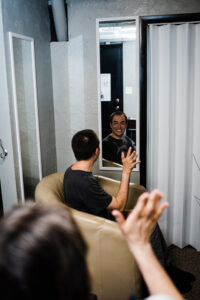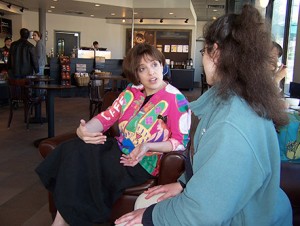
While social skills lessons begin in my office, client session appointments can also take place in the public setting for skill practice as a client needs. One example is that I offer support to clients via a cell phone call as they participate in a social situation, practicing their new social skills in public.
Another public social skill practice strategy that I use with clients in the community is to practice “People Watching.” My client and I will observe other people’s body language and facial expressions in various public social situations, so that my client can practice reading others’ non-verbal body language.

Research shows that individuals with Autism Spectrum Disorders, Asperers, ADHD, ADD, Social Anxiety and those with learning differences acquire social skills most easily through Experiential Learning, rather than instruction only received in an office setting.